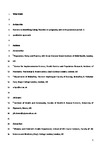Barriers to identifying eating disorders in pregnancy and in the postnatal period: a qualitative approach.
| dc.contributor.author | Bye, A | |
| dc.contributor.author | Shawe, J | |
| dc.contributor.author | Bick, D | |
| dc.contributor.author | Easter, A | |
| dc.contributor.author | Kash-Macdonald, M | |
| dc.contributor.author | Micali, N | |
| dc.date.accessioned | 2018-05-18T10:34:25Z | |
| dc.date.issued | 2018-05-15 | |
| dc.identifier.issn | 1471-2393 | |
| dc.identifier.issn | 1471-2393 | |
| dc.identifier.other | 114 | |
| dc.identifier.uri | http://hdl.handle.net/10026.1/11514 | |
| dc.description.abstract |
BACKGROUND: Eating Disorders (ED) are mental health disorders that typically effect women of childbearing age and are associated with adverse maternal and infant outcomes. UK healthcare guidance recommends routine enquiry for current and past mental illness in antenatal and postnatal care for all women, and that pregnant women with a known ED are offered enhanced monitoring and support. Midwives and health visitors are ideally placed to identify and support women with ED as they are often the primary point of contact during the antenatal and postnatal periods. However, research on the barriers to identifying ED in the perinatal period is limited. This study aimed to understand the barriers to disclosure and identification of ED in pregnancy and postnatally as perceived by women with past or current ED, and midwives and health visitors working in the UK National Health Service. METHODS: Two studies were undertaken: mixed-measures survey of pregnant and postnatal women with current or past ED; focus groups with student and qualified midwives and health visitors. RESULTS: Five themes emerged on the barriers to disclosure in pregnancy as perceived by women: stigma, lack of opportunity, preference for self-management, current ED symptomatology and illness awareness. Four themes were identified on the barriers to identification of ED in pregnancy and in the postnatal period as perceived by health professionals: system constraints, recognition of role, personal attitudes, and stigma and taboo. CONCLUSIONS: Several barriers to the identification of ED during and after pregnancy were described, the main factors were stigma and poor professional training. Perinatal mental health is becoming increasingly prioritised within national policy initiatives; however, ED continue to be neglected and increased awareness is needed. Similarly, clinical guidance aimed at responding to the rising prevalence of obesity focus on changing nutrition but not on assessing for the presence of ED behaviours that might be affecting nutrition. Improving education and training for health professionals may contribute to reducing stigma and increase confidence in identifying ED. The barriers identified in this research need to be addressed if recognition and response to women with ED during the perinatal period is to improve. | |
| dc.format.extent | 114-114 | |
| dc.format.medium | Electronic | |
| dc.language | en | |
| dc.language.iso | en | |
| dc.publisher | BioMed Central | |
| dc.subject | Barriers | |
| dc.subject | Disclosure | |
| dc.subject | Eating Disorders | |
| dc.subject | Identification | |
| dc.subject | Pregnancy | |
| dc.subject | Qualitative research | |
| dc.title | Barriers to identifying eating disorders in pregnancy and in the postnatal period: a qualitative approach. | |
| dc.type | journal-article | |
| dc.type | Article | |
| plymouth.author-url | https://www.ncbi.nlm.nih.gov/pubmed/29759082 | |
| plymouth.issue | 1 | |
| plymouth.volume | 18 | |
| plymouth.publication-status | Published | |
| plymouth.journal | BMC Pregnancy and Childbirth | |
| dc.identifier.doi | 10.1186/s12884-018-1745-x | |
| plymouth.organisational-group | /Plymouth | |
| plymouth.organisational-group | /Plymouth/Faculty of Health | |
| plymouth.organisational-group | /Plymouth/Faculty of Health/School of Nursing and Midwifery | |
| plymouth.organisational-group | /Plymouth/REF 2021 Researchers by UoA | |
| plymouth.organisational-group | /Plymouth/REF 2021 Researchers by UoA/UoA03 Allied Health Professions, Dentistry, Nursing and Pharmacy | |
| plymouth.organisational-group | /Plymouth/Research Groups | |
| plymouth.organisational-group | /Plymouth/Research Groups/Institute of Health and Community | |
| plymouth.organisational-group | /Plymouth/Research Groups/Plymouth Institute of Health and Care Research (PIHR) | |
| plymouth.organisational-group | /Plymouth/Users by role | |
| plymouth.organisational-group | /Plymouth/Users by role/Academics | |
| dc.publisher.place | England | |
| dcterms.dateAccepted | 2018-04-15 | |
| dc.rights.embargodate | 2019-12-17 | |
| dc.identifier.eissn | 1471-2393 | |
| dc.rights.embargoperiod | Not known | |
| rioxxterms.versionofrecord | 10.1186/s12884-018-1745-x | |
| rioxxterms.licenseref.uri | http://www.rioxx.net/licenses/all-rights-reserved | |
| rioxxterms.licenseref.startdate | 2018-05-15 | |
| rioxxterms.type | Journal Article/Review |


